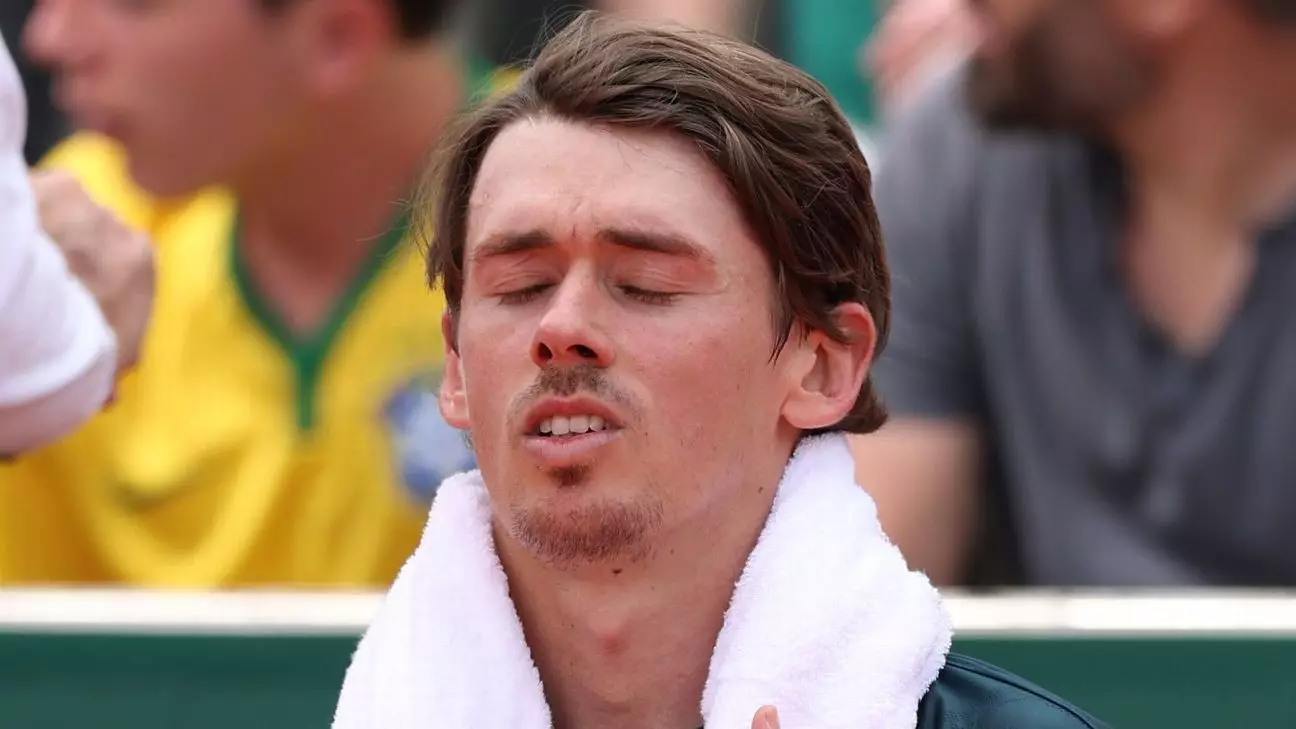The world of professional tennis is often touted as glamorous and exhilarating, yet beneath the surface lies a troubling reality that many players grapple with: the relentless grind of the tennis calendar. Recent comments from Australian tennis star Alex De Minaur after his early exit from the French Open have shone a glaring light on an issue that has been bubbling under the surface for years. De Minaur’s assertion that the tennis season is overly taxing is not just personal grumbling; rather, it reflects a widespread sentiment among players struggling with the physical and mental demands of an uncapped schedule.
As a professional athlete, the expectation is to perform at elite levels consistently throughout the year. However, the calendar frenzy that kicks off with the United Cup shortly after the Davis Cup finals sets a grueling tone for the season. For many, including De Minaur, the relentless schedule creates a cycle where players find themselves looping back into rigorous training mere days after a significant event. The sheer volume of matches, combined with the pressure to perform, risks amplifying fatigue, leading to burnout that could ultimately shorten careers.
A Call for Change
De Minaur’s call to shorten the tennis season may seem like a straightforward fix, but it touches on deeper systemic issues within the ATP structure. Players like Casper Ruud have echoed similar sentiments, framing the current ranking system as a “rat race” that leaves little room for recovery or injury management. When players are penalized for not competing in mandatory events, the incentive to prioritize health and well-being diminishes dramatically.
It’s a lose-lose situation: players are pressured to stay in the game even when injured, resulting in compromised performance and prolonged recovery times. Ruud’s observation about the impact on year-end bonuses—specifically, a hefty 25% cut for missing a mandatory event—highlights an alarming aspect of this culture. The current setup seems designed to reward participation rather than performance and well-being, creating an environment where athletes prioritize participation over health.
The Emotional Toll
What De Minaur and Ruud are experiencing is not merely physical weariness but an emotional marathon that accompanies their careers. The absence of a sustainable calendar can foster a toxic atmosphere where mental health becomes an afterthought. It’s a precarious balance for athletes who might feel pressured to showcase resilience at the expense of their emotional and physical state. Players are forced to navigate the tumultuous waters of injuries, fatigue, and the knowledge that skipping tournaments could significantly impact their rankings—and their livelihoods.
When considering the vast resources at the disposal of the ATP, one must ask why a human-centric approach to the calendar has yet to materialize. As fans, we rarely see the struggle behind the scenes. What we often celebrate as thrilling athleticism is built upon the stress and strain of constant competition.
Reimagining the Tennis Ecosystem
A revised, shorter season could provide numerous benefits. For one, better-rested athletes are likely to deliver higher-caliber performances, generating excitement and intrigue for fans and sponsors alike. Moreover, healthier players could contribute to the sport’s longevity, thus ensuring that audiences continue to engage with their favorite stars well into their careers.
Moreover, tennis authorities should reconsider the current punitive structures linked to mandatory tournaments. It would be far more beneficial to create a system that values health and well-being as key components of athletic success. A more flexible ranking system, one that prioritizes player welfare and offers penalties for over-scheduling rather than absence, could revolutionize the landscape of tennis for the better.
Empowering players to prioritize their well-being could serve as a model for other sports grappling with the same issues. The collective voice of athletes like De Minaur and Ruud is essential in this pursuit for change, as they face the harsh realities of the professional sports circuit head-on. Perhaps there finally exists a threshold of awareness that can catalyze change, leading to a more humane and sustainable tennis ecosystem. As the sport evolves, it must reshape itself into a construct that celebrates not only the wins but also the well-being of its players.


Leave a Reply